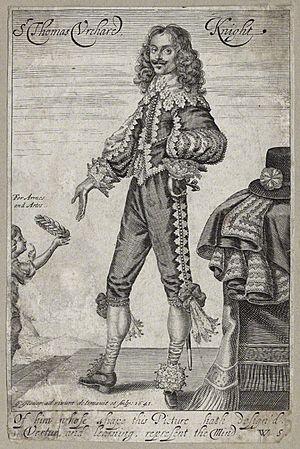Thomas Urquhart facts for kids
Quick facts for kids
Sir
Thomas Urquhart
|
|
|---|---|

Urquhart in a 1641 engraving by George Glover
|
|
| Born | 1611 Cromarty, Scotland
|
| Died | 1660 (aged 48–49) Cromarty, Scotland
|
| Education | King's College, Aberdeen |
| Occupation | translator and author |
|
Notable work
|
Logopandecteision |
Sir Thomas Urquhart (born 1611, died 1660) was a Scottish nobleman, writer, and translator. He is most famous for translating the books of a French writer named François Rabelais into English.
About Thomas Urquhart
Early Life and Education
Thomas Urquhart was born in Cromarty, Scotland, in 1611. His father was also named Thomas Urquhart, and his mother was Christian Elphinstone. When he was eleven years old, he went to King's College at the University of Aberdeen. After college, he traveled around Europe. He came back to Scotland in 1636.
Supporting the King
In 1639, Thomas Urquhart joined a group of people who supported the King. This event was called the Trot of Turriff. Because of his support, King Charles I made him a knight at Whitehall. In 1641, he published his first book, which was a collection of short, clever poems called epigrams.
Facing Financial Troubles
Thomas Urquhart's father passed away in 1642. He left behind a large estate, but also many debts. As the oldest son, Thomas had to deal with people who wanted money from his family. He went back to Europe to save money. However, he returned in 1645 and published a math book called Trissotetras.
Fighting for the Royalists
In 1648, Urquhart took part in another uprising for the King in Inverness. The Parliament declared him a traitor, but he didn't seem to face serious punishment. Two years later, he joined King Charles II and fought in the Battle of Worcester. The King's side lost badly, and Urquhart was captured. He lost all his writings and his property.
He was held prisoner first in the Tower of London and then at Windsor. Even as a prisoner, he had a lot of freedom. In 1651, he published two more books: Pantochronachanon, a family history, and The Jewel, which defended Scotland.
Later Life and Famous Work
In 1652, Cromwell let him go, and Urquhart returned to Cromarty. Soon after, he published Logopandecteision, which was his idea for a universal language. He also published his most famous work, his translation of Rabelais's books.
Urquhart went back to Europe sometime after 1653. We don't know much about his life after that. He died by 1660, because his younger brother took over his family titles that year. There is a story that he died from laughing too hard when he heard that King Charles II was back on the throne.
Urquhart's Writings
Thomas Urquhart wrote several interesting and unique books.
Epigrams, Divine and Moral (1641)
This was a collection of short poems. While these types of poems were popular then, critics haven't thought highly of Urquhart's collection. They often say the poems are not very original.
Trissotetras (1645)
This book was about trigonometry, a branch of mathematics. Urquhart used Napier's logarithms and created new names for things to help people remember them. His system was very complicated and hard to understand. Even though Urquhart was a good mathematician, his method was never used by others.
Pantochronachanon (1652)
This book was a family tree of the Urquhart family. In it, Urquhart claimed to list 153 generations of his ancestors, all the way back to Adam and Eve! Many people thought this book was a joke, even when it was first published.
The Jewel (Ekskybalauron) (1652)
This book was a mix of different topics. It included an idea for Urquhart's universal language. Most of the book, however, was about defending the honor of Scotland. It shared stories about many Scottish soldiers and smart people. It also included a made-up story about a Scottish hero named James Crichton. This part is very famous and has been printed separately.
Logopandecteision (1653)
This book also talked about Urquhart's idea for a universal language. He didn't give a list of words, but he explained that words would be built in a way that showed their meaning. This book also included some complaints about the people he owed money to.
The Works of Rabelais (1653)
This is the work that Thomas Urquhart is most famous for. He translated the books of the French writer Rabelais into English. Many people, like the author Charles Whibley, have called it one of the best translations ever. Urquhart's love for words and his unique style were perfect for Rabelais's writing. It's a very lively translation that captures the spirit of the original. The third book of Rabelais was finished and published after Urquhart's death by Peter Anthony Motteux.
Urquhart's Writing Style
Urquhart had a very special way of writing. His sentences were often long and detailed. He loved to use unusual and rare words. Sometimes, his writing could be hard to understand because it was so fancy. However, at its best, his style was rich, fast-paced, and full of interesting and new ideas. He often made up new words, but none of them became as popular as words made up by other writers of his time.
In Popular Culture
Thomas Urquhart has appeared in modern stories and books.
- He is the main character in a short story by Alasdair Gray called "Sir Thomas's Logopandocy." This story is in Gray's book Unlikely Stories, Mostly. Urquhart also appears in the drawings throughout that book.
- Urquhart is an important character in the novel A Hand-book of Volapük by Andrew Drummond. His language ideas, along with other created languages like Volapük and Esperanto, are important parts of the story.
- In Robertson Davies' book series The Cornish Trilogy, one character named Urquhart McVarish claims to be related to Sir Thomas Urquhart.
 | Jackie Robinson |
 | Jack Johnson |
 | Althea Gibson |
 | Arthur Ashe |
 | Muhammad Ali |

